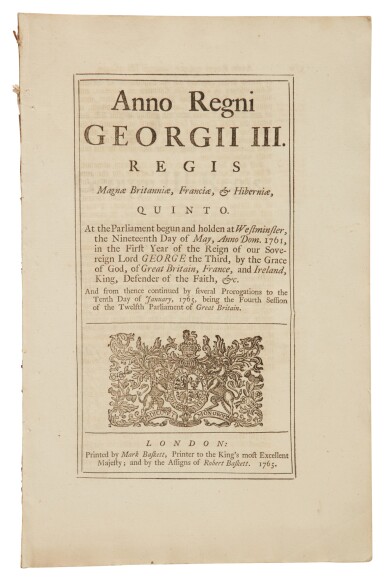Parliamentary Act. Reign of George IIIAn Act for granting certain Duties in the British Colonies and Plantations in America; for continuing, amending, and making perpetual, an Act passed in the Sixth Year of the Reign of His late Majesty King George the Second, (intituled, An Act for the better securing and encouraging the Trade of his Majesty’s Sugar Colonies in America); for applying the Produce of such Duties, and of the duties to arise by virtue of this said Act, towards defraying the Expences of defending, protecting, and securing, the said Colonies and Plantations. … London: Printed by Mark Baskett and the Assigns of Robert Baskett, 1764 Folio (318 x 197 mm). Woodcut arms of Great Britain, woodcut initial, text in black letter, side notes in roman type. Disbound. Tan cloth chemise and slipcase, green morocco spine lettered gilt. The Sugar Act was British legislation aimed at ending the smuggling trade in sugar and molasses from the French. Its auxiliary goal was to raise 100,000 pounds to defray a portion of military expenses in North America. On 5 April 1764, Parliament passed a modified version of the Sugar and Molasses Act (1733), which was about to expire. Under the original Molasses Act colonial merchants had been required to pay a tax of six pence per gallon on the importation of foreign molasses. The Sugar Act of 1764 reduced the rate of tax by half in an effort to discourage smuggling, while imposing higher taxes on coffee, indigo, cambric and printed calico, and Madeira wine. The act also gave customs agents more latitude with respect to conducting seizures and enforcing customs law. The First Lord of the Treasury, George Grenville, took further measures to see that the duty was strictly enforced by bolstering naval presence. The vigorously enforced tax on molasses caused the almost immediate decline in the rum industry in the colonies. The combined effect of the new duties was to sharply reduce the trade with Madeira, the Azores, the Canary Islands, and the French West Indies, all key destination ports for lumber, flour, cheese, and assorted farm products. The situation disrupted the colonial economy by reducing the markets to which the colonies could sell, as well as the amount of currency available to them for the purchase of British manufactured goods. The Act was repealed in 1766. REFERENCE:ESTC N56801
Parliamentary Act. Reign of George IIIAn Act for granting certain Duties in the British Colonies and Plantations in America; for continuing, amending, and making perpetual, an Act passed in the Sixth Year of the Reign of His late Majesty King George the Second, (intituled, An Act for the better securing and encouraging the Trade of his Majesty’s Sugar Colonies in America); for applying the Produce of such Duties, and of the duties to arise by virtue of this said Act, towards defraying the Expences of defending, protecting, and securing, the said Colonies and Plantations. … London: Printed by Mark Baskett and the Assigns of Robert Baskett, 1764 Folio (318 x 197 mm). Woodcut arms of Great Britain, woodcut initial, text in black letter, side notes in roman type. Disbound. Tan cloth chemise and slipcase, green morocco spine lettered gilt. The Sugar Act was British legislation aimed at ending the smuggling trade in sugar and molasses from the French. Its auxiliary goal was to raise 100,000 pounds to defray a portion of military expenses in North America. On 5 April 1764, Parliament passed a modified version of the Sugar and Molasses Act (1733), which was about to expire. Under the original Molasses Act colonial merchants had been required to pay a tax of six pence per gallon on the importation of foreign molasses. The Sugar Act of 1764 reduced the rate of tax by half in an effort to discourage smuggling, while imposing higher taxes on coffee, indigo, cambric and printed calico, and Madeira wine. The act also gave customs agents more latitude with respect to conducting seizures and enforcing customs law. The First Lord of the Treasury, George Grenville, took further measures to see that the duty was strictly enforced by bolstering naval presence. The vigorously enforced tax on molasses caused the almost immediate decline in the rum industry in the colonies. The combined effect of the new duties was to sharply reduce the trade with Madeira, the Azores, the Canary Islands, and the French West Indies, all key destination ports for lumber, flour, cheese, and assorted farm products. The situation disrupted the colonial economy by reducing the markets to which the colonies could sell, as well as the amount of currency available to them for the purchase of British manufactured goods. The Act was repealed in 1766. REFERENCE:ESTC N56801















Testen Sie LotSearch und seine Premium-Features 7 Tage - ohne Kosten!
Lassen Sie sich automatisch über neue Objekte in kommenden Auktionen benachrichtigen.
Suchauftrag anlegen